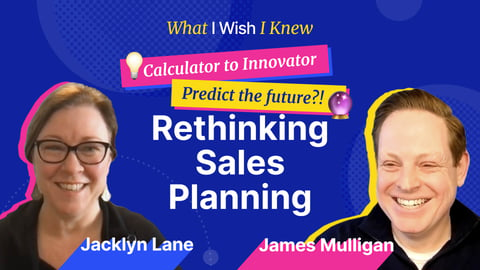In this edition of What I Wish I Knew, I was joined by Bruce Jackson, an industry expert from Blue Horizons Group. He shared his perspective from over 25 years of partnering with companies to navigate the ups and downs of the market. Bruce offered his valuable insights and tactics for achieving success, even in challenging times.
Here are three key topics we covered in our conversation.
Is Your Comp Plan Doing What You Want It To?
In today’s economic climate, B2B buyers are becoming more conservative in their spending, and external factors like an upcoming election year can further complicate the picture. As a result, sales cycles are becoming longer and require a continuous evaluation of your go-to-market strategies. Adaptability is key. What might have worked at the beginning of the year may not be effective six months later.
Do your sales plans need a mid-year adjustment? Take this quiz for a quick assessment.
A continuous evaluation cycle throughout the year cannot be effectively done within a spreadsheet. That’s where a dedicated modeling environment becomes critical.
Bruce offered guidance on how to tackle these challenges:
- Regularly assess and adjust your sales plans
- Leverage analytics to identify high-preforming and underperforming areas
- Align compensation decisions with your organization’s go-to-market strategy
How Do You Keep Sales Teams Motivated in a Tough Economy?
Bruce emphasizes the importance of focusing on factors within our control, even when external circumstances may be beyond our control. While it may take longer to close a deal in a tough economy, it's crucial to see it as an opportunity rather than a lost sale. Sellers should use this extra time to nurture relationships and build trust with clients.
Empathy is also crucial, particularly in tougher times. Your sellers definitely need empathy. Guess who else needs empathy? Prospects. They seek reassurance and low-risk investments, so enhancing your sellers' understanding of clients' perspectives can improve estimates of deal closure times and churn rates.
To adapt to market changes and meet the needs of buyers, continuous sales training is essential. It equips your team to handle objections, maintain momentum, and seal the deal, even with prolonged sales cycles.
Here are a few tactics for boosting seller morale and building a positive sales culture:
- Regularly communicate company strategy, goals, and progress
- Recognize and celebrate small achievements
- Provide ongoing resources, coaching and feedback sessions
What Compensation Strategy Can Boost Seller Morale and Sales Activities?
Firstly, let’s discuss the idea of quota relief. When a salesperson’s quota is reduced from $100k to $70k one year, it can be daunting to ramp it back up to $110k the next year. This 'pendulum swing' in quota setting may impact your team's morale and potentially drive your best talent away. Quota relief could also be a dangerous precedent to set where your tenured reps see this as a possible fallback in future tough times.
Rather than adjusting quotas, consider alternative solutions such as double counting sales of a high margin or a highly desirable product towards quota relief. This approach makes the process of meeting quotas steadier and more predictable, and ensures you keep your sales team motivated and focused on the right things.
How Can You Leverage Sales Data Analysis for Confident Decision-Making?
The dreaded year-end fire drill. Everyone knows it’s coming as it usually involves finding answers to the same questions. But just knowing these questions are coming doesn’t make them easier to answer. Accurate sales forecasting is harder than ever due to longer sales cycles, growing buying teams, and reluctant buyers slowing down deals. As executives face their performance against their targets, they are often asked: why is there a gap? How do we close the gap between what we forecasted we were going to sell and where we are now? What’s the best way to pivot? And this leads to a last-minute scramble for sales data analysis.
To avoid this annual fire drill, access to smarter data combined with the right technology will empower you to take action on better sales data analysis for things like:
- Proactive monitoring of the sales pipeline,
- Analysis of sales seasonality trends, and
- Alignment of incentive compensation plans to go-to-market strategies.
By understanding which areas of your business are thriving and which are lagging, you can make data-driven decisions about where to direct your efforts.
How Can You Take Advantage of AI?
Artificial intelligence (AI) is also a valuable tool that everyone in every industry should consider. AI can assist with research and administrative work, enhancing your productivity and efficiency. But Bruce reminds us that AI is a tool that helps with decision-making. It doesn’t make the decisions for you.
No matter the size, companies feel the impact of volatility similarly. By taking a proactive approach, fostering collaboration, and embracing data-driven decision-making, organizations can navigate through challenging times and emerge even stronger.
For the past few episodes of What I Wish I Knew, we have asked our guests a series of quick questions. In this episode, Bruce talked about the impact of emerging technologies, like AI.
He reminded us that while technology has many benefits and offers valuable insights, it's crucial to remember that building relationships is what matters when you're in a room with a prospective client. So, remember to shut the laptop and put the phone down.
What piece of wisdom will be revealed in our next Quick Questions segment? Stay tuned for the next episode!
The next LinkedIn Live event will cover a very timely and important topic that’s top of mind for many in the sales industry this time of year. Hint: Bruce touched upon it in this episode.



